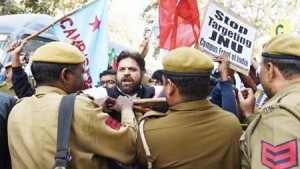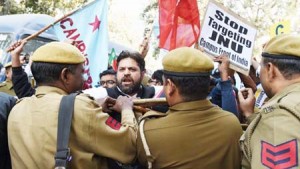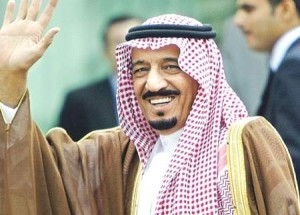The Financial Times
Amy Kazmin
 India has abruptly found itself at a crucial political juncture, with the arrest of an elite university student for alleged sedition revealing deep social fissures over how far political freedom — and dissent — should extend.
India has abruptly found itself at a crucial political juncture, with the arrest of an elite university student for alleged sedition revealing deep social fissures over how far political freedom — and dissent — should extend.
With a brief exception during the 1970s-era “emergency”, independent India has been a raucous democracy, known for vigorous, heated debate on even the most sensitive issues. But liberals suspect that Prime Minister Narendra Modi and his Bharatiya Janata party want to reshape India as a Southeast Asian-style democracy, which has elections, but also narrow boundaries of acceptable political discourse, aggressively policed by state power.
That fear was fanned on February 12, by a crackdown at New Delhi’s prestigious Jawaharlal Nehru University, after students were accused of chanting “anti-national” slogans during a non-violent campus protest against the death penalty. Since ending an eight-year, de facto moratorium on capital punishment in late 2012, India has executed three people — all Muslims convicted of terror offences.
After India’s home minister, Rajnath Singh, ordered “tough action” against the “anti-nationals”, Delhi police swiftly arrested Kanhaiya Kumar, a PhD student and president of JNU’s student union, for sedition and launched a manhunt for the other protest organisers.
It was the third time in the past few months the BJP government has involved itself in schoolyard squabbles on elite university campuses, where its student wing — the Akhil Bharatiya Vidyarthi Parishad — is growing increasingly assertive against what it deems “anti-national” discourse.
In June, the Indian Institute of Technology Madras banned a lower-caste student “study circle” for “misusing its privileges” after an anonymous complaint to the national government that the group’s political debates were promoting “hatred” of Mr Modi and government policies.
The complainant appeared particularly irked by a debate on the BJP government’s order for all IIT campuses across the country to have separate dining halls for vegetarians and non-vegetarians — a sensitive issue for India’s lower castes, who normally eat meat. IIT Madras reversed its decision to ban the group, reinstating it just a week later after protests against the ban at other IITs and social media outrage.
In July, the BJP’s labour minister complained that Hyderabad University was a “den of casteist, extremist and anti-national politics” after an altercation between lower-caste students protesting India’s latest execution and ABVP activists.
After New Delhi repeatedly prodded the university to act on the minister’s complaint, it finally expelled four of the lower-caste students from their dorm rooms and banned them from campus last month. Two weeks later, one of the students committed suicide.
But the arrest of a PhD student on sedition charges — simply for uttering provocative and, to some, offensive chants — has galvanised and divided Indian society. Rightwing groups, television channels and lawyers have cheered the tough action against what a commentator in the conservative Swarajya magazine called “pampered pseudo-revolutionaries who abuse the very freedom they claim to be fighting for”. “The whole notion of the necessity of student activism and party politics in campuses is wrong,” another Swarajya commentator, Arihant Pawariya wrote. “Politics, if to be allowed in campuses, should be restricted to only protesting and discussing issues related to university or hostel problems of students.”
Liberals are horrified at the turn of events. “In all free societies, students have espoused all sorts of extreme positions and must be free to do so,” Swaminathan Aiyer, consulting editor for The Economic Times, wrote in an anguished column. “That is why they are called free societies.”
In recent years, India has seen rising friction between its ideals of a progressive democracy, with a constitutional guarantee of free speech, and repressive British colonial-era laws never purged from its statute books, including the sedition act and a ban on speech considered “offensive to others”.
Indians have been reconciled to ambiguity of such discordant principles, even as colonial laws were increasingly invoked to quell written and artistic works, including novels, paintings and academic tomes. But with the government’s new preoccupation on what is uttered from the mouth, tensions are mounting and the very nature of India’s democracy is in play.




